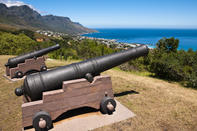Camps Bay is a suburb 11 km south-west of Cape Town, on the slopes of the Twelve Apostles. As you may know, the expression to ‘be camp’ as in limp-wristed, has a very different meaning from ‘to camp,’ as in tents and sleeping bags.

A Bit of History
As you may know, the expression to ‘be camp’ as in limp-wristed, has a very different meaning from ‘to camp,’ as in tents and sleeping bags. This extremely rich Cape Town suburb was not named, however, because of either of these meanings. When Jan Van Riebeeck first arrived in South Africa his job was to create a victuals station for the Dutch East India Company, which he did on the slopes of Table Mountain.
This caused some tension between the Company and the Khoisan, who used this area as their grazing grounds and were now being restricted to only being able to graze their herds in the Camps Bay area. Diseases such as measles and smallpox depleted the Khoisan population quite drastically, and by 1713 there was very little left showing of their presence there.
From Sailor to Landowner

With the decimation of the Khoisan, the area was available to the Europeans. Land was granted to John Lodewyk Wernich, who established a farm there called Ravensteyn. Upon John Lodewyk Wernich’s death, his son Johan inherited the land, and upon his death, his widow Anna (nee Koekemoor), inherited the farm.
In 1778, with many of the sailors at this time trying to jump ship, all sailors were refused shore leave in Cape Town unless they had been taken ill. One fortunate sailor by the name of Fredrik Ernst Von Kamptz became ill and was sent to hospital. Before being discharged, on regaining his health, Von Kamptz jumped out of the hospital window and fled to Camps Bay.
Here he met the attractive widow Anna, she was very attractive as she owned a farm, and quickly married her. The farm prospered and the area became to be known as Die Baai van Von Kamptz, which later was shortened to Camps Baai (Bay). War, unfortunately, broke out between the Dutch, English and French, which required a guardhouse to be built to help prevent the enemy from landing.
During the fighting, the farm was left in ruins, which Von Kamptz later demanded to be compensated for. The farm was bought by the government and a homestead built as a holiday home for Lord Charles Somerset, with a hunting lodge attached, which is currently the Roundhouse restaurant overlooking Camps Bay.
By Ann Gadd
 After the delights of Clifton, Victoria Drive leads out of the cliffs into Camps Bay. Camps Bay is now one of the most exclusive suburbs in ...
After the delights of Clifton, Victoria Drive leads out of the cliffs into Camps Bay. Camps Bay is now one of the most exclusive suburbs in ...